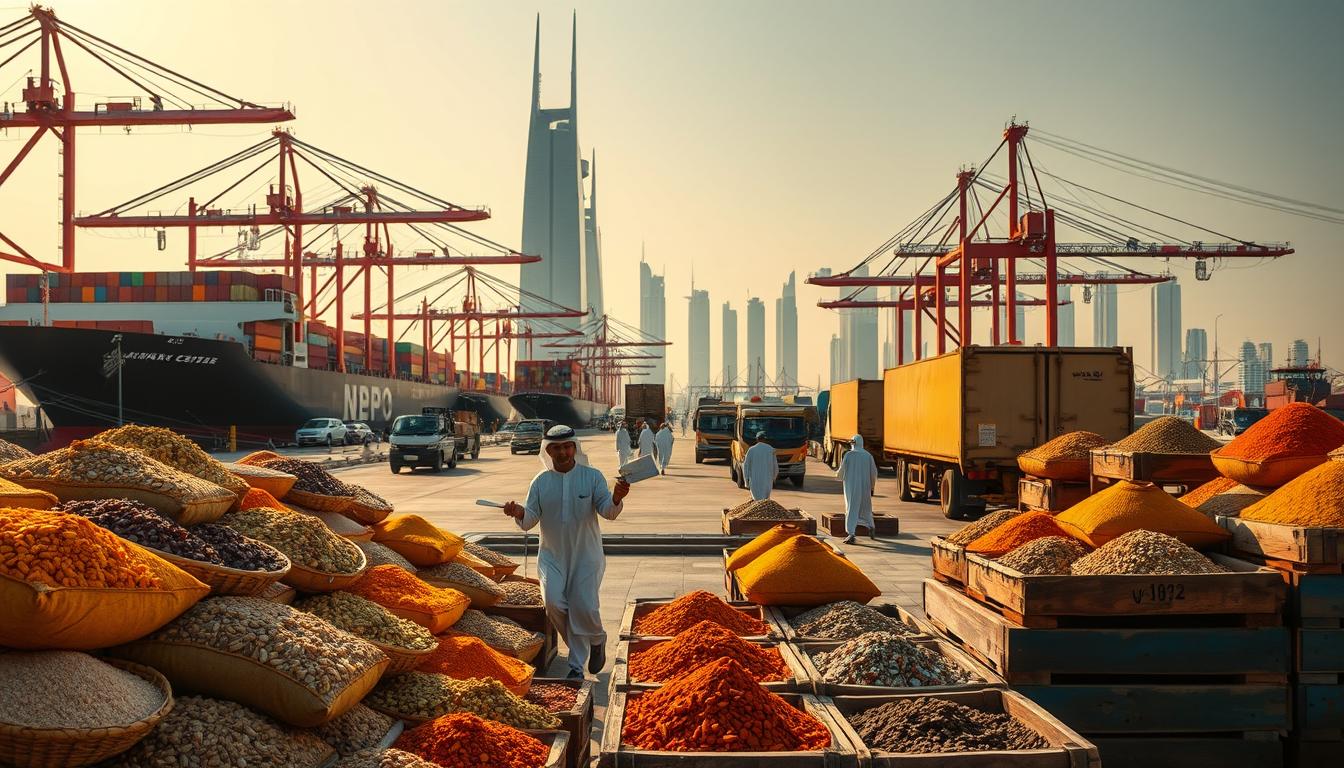Spices Import: Your Guide to Global Flavors

Spices import has shaped economies for centuries. Today, the international spice trade is a key part of global commerce. The UAE is a key hub, linking spice-rich areas with Middle Eastern markets. This guide offers steps for businesses to enter this market, blending tradition with modern strategies.
Key Takeaways
- UAE’s ports and free zones make it easy to join the $100+ billion international spice trade.
- Old spice routes guide today’s supply chains for quality-focused businesses.
- Following regulations is key to success in the competitive spices import field.
- Top exporters like India and Vietnam offer a wide range of options for UAE importers.
- Keeping up with market trends and ensuring quality are essential to stand out in global spice supply.
The Global Spice Trade: An Overview
For centuries, the international spice trade has shaped global economies. Ancient traders braved long voyages to bring back valuable spices like cinnamon and pepper. This drove exploration and colonization. Today, it connects farmers in tropical areas to consumers all over the world.
Today, the market is growing steadily. The global spice sector is expected to hit $50 billion by 2025. This growth is due to more people wanting authentic flavors in their cooking and wellness products.
India, Indonesia, and Vietnam are the biggest spice exporters, making up 60% of the market. Countries like the UAE, the US, and those in Europe are the biggest buyers. They look for high-quality spices for food, cosmetics, and medicines.
Top Producers: India (black pepper, cumin), Indonesia (nutmeg, cloves)
Key Markets: UAE, China, Germany
Key Players: McCormick, Givaudan, and local UAE distributors
In the UAE, importing spices from abroad is a great opportunity. The UAE’s location and free trade agreements make it easy to get into the Middle Eastern and global markets. Knowing when to import, like during Ramadan and Eid, can help businesses.
New trends like organic spices and traceability systems are changing the industry. Understanding these changes is key for businesses to succeed in the international spice trade.
Benefits of Importing Spices to the UAE
Spice importers in the UAE find a booming market thanks to the country’s key trade spot. The UAE has no import duties on farm goods and free trade deals, cutting costs. Plus, top ports like Jebel Ali and Dubai World Central make shipping easy. This makes the UAE a key place for spice distributors to reach customers in the Middle East, Asia, and Europe.
Tax advantages: No tariffs on spices lower costs for businesses.
Logistics excellence: Dubai’s setup handles 30% of spice imports in the region.
Cultural demand: The UAE’s diverse people want a wide range of spices, from Indian masalas to Indonesian cinnamon.
Global reach: The UAE sends 65% of its spices to other countries, increasing profits.
Spice distributors use the UAE to ship to over 50 countries. A Dubai-based distributor saw sales jump by 40% by using free zones. These areas offer storage and customs help, making things easier.
The UAE’s tax-free status and trade connections open doors for spice importers. They can improve their supply chains and meet local and global needs. It’s a great place for growing a spice business.
Conclusion: Building a Successful Spices Import Business in the UAE
To succeed in the UAE spices import market, plan carefully and pay attention to details. Start by working with reliable global suppliers. Make sure you follow UAE trade rules and check quality closely.
Building a strong network of spices distributors is key. This helps you reach out to retailers, restaurants, and customers easily.
Focus on unique markets like organic spices or special blends to stand out. Getting certifications like USDA Organic or Fair Trade can attract health-focused buyers. Consider teaming up with local stores or online sites to grow your reach.
Adding value through packaging or private labels can increase your profits. Keep up with trends like traceability and eco-friendly packaging. Watch for changes in what people want in terms of flavors and adjust your stock as needed.
Start with popular items like saffron or black pepper. Then, you can grow your business. Always do your homework on the market and check your suppliers regularly to keep doing well.
There are chances to sell both to businesses and directly to people. Use the UAE’s good location to sell to other countries when you’re ready. Being flexible is important to succeed in this fast-changing field.
Recent Post
